DNP (2,4-Dinitrophenol) 200mg 30 Caps
$130.00
2,4-Dinitrophenol (DNP) is a chemical used by advanced bodybuilders as a supplement for extreme and fast weight loss, but it’s also used by regular people. It was originally used as an explosive, pesticide and in other industrial applications such as dyes, wood treatment, herbicides and photo development. In 1933 Maurice Tainter, a researcher at Stanford University, found out it can cause fast weight loss and later marketed the drug as an over the counter diet pill.
DNP works by decreasing the efficiency of cellular ATP (Adenosine Triphosphate) production. This forces mitochondria to use more energy to make ATP, increasing metabolic rate and caloric output. This means weight loss.
For better understanding, imagine every time you take a step it actually burns 11-33% more energy to do so. That’s how this substance burns calories.
Description
In 1981 DNP resurfaced through Mitcal, available only through private practice. Unfortunately, this was plagued with many side effects and 1 death. In 1986 the doctor administering the drug was convicted of drug violations and in 2008 was jailed for making unsubstantiated medical claims.
In recent years it has come back and is mostly used in the bodybuilding community. Since the early 2000s, there have been over 10 reported deaths from using it.
Certainly, here’s a revised version of the information about the benefits, side effects, and recommended dosage of DNP:
Benefits of DNP
- Weight Loss: The main benefit of DNP is weight loss.
- Increased Metabolism: This uncouples oxidative phosphorylation, and reduces cell ATP production. Cells then produce more ATP, consume more energy and increase metabolism and weight loss.
- Heat Production: This alters the proton electrochemical gradient, energy is lost as heat instead of ATP. More heat production means more caloric expenditure and weight loss.
- Glycolysis Stimulation: It upregulates glycolysis and when combined with uncoupling, leads to carbohydrate depletion. These mechanisms decrease energy production efficiency and increase energy expenditure and weight loss.
- Potential for Neurological Disorders: Preliminary research shows DNP may be beneficial for age-related neurological disorders. Studies on rat models show reduction of stroke damage, improvement of motor function in Huntington’s Disease and resistance to neurodegeneration in Parkinson’s Disease. More research in humans is needed to determine safety and efficacy.
- Appetite Suppression: It’s strong appetite suppression makes dieting easier, you’ll eat less because you’re less hungry.
- Carb Tolerance Reduction: It reduces carb tolerance, so you’ll go on a low-carb diet and lose more weight.
- Potential for Liver Disease: A time-released DNP pill can reduce liver lipids significantly, and may be used to treat non-alcoholic fatty liver disease (NAFLD) and diabetes.
- Diabetes Management: This has been shown to increase insulin sensitivity and reverse diabetes in rat studies, suggesting potential benefits for individuals with diabetes.
- Mitochondrial Protection: Its mitochondrial uncoupling may protect mitochondria from ROS-mediated cell death, and may have therapeutic applications.
Side Effects:
- Cardiovascular Failure: This can cause rapid and uncontrollable temperature increases and in some cases cardiovascular failure which is the most common cause of death associated with its use.
- Respiratory and Cardiovascular: Rapid shallow breathing, increased heart rate and blood pressure.
- Hyperthermia: This can cause hyperthermia and extreme temperature increases.
- Vision Impairment: This is associated with blindness.
- Other Side Effects: Fever, confusion and occasional convulsions.
- Narrow Therapeutic Window: This has a narrow therapeutic window and can cause severe side effects at recommended doses. Its overdose is life-threatening.
- Thyroid Regulation: DNP may down-regulate thyroid levels, specifically T3.
- Electrolyte Depletion: This can cause electrolyte imbalances (potassium in renal tissue and phosphate in cells).
- Insomnia: Some users experience insomnia.
- Excessive Sweating: This can cause diaphoresis or excessive sweating.
- Note: Many of these side effects can occur within recommended dosage ranges.
Recommended Dosage:
Standard online protocols suggest increasing dosage gradually from 200-400mg and stopping after 2 weeks. Please note that these dosage recommendations are anecdotal and not backed by science.
Fatalities have been reported at 4.3mg/kg and 5g, so we don’t know what is a safe dosage. Rats studies for neurological disorders used 5mg/kg for very short periods. So be careful with DNP as it’s unpredictable and risky.
FAQ:
Can DNP kill you?
Yes, high doses of DNP can cause hyperthermia and kill you.
Why is DNP so bad?
It ramps your metabolism up to crazy high and can cause all sorts of nasty side effects including fever and dehydration.
Is DNP a weight loss drug?
Yes, it can increase metabolism by 33% and burn more calories at rest.
Is DNP a steroid?
No, it’s not a steroid.
What does DNP do to cellular respiration?
It’s a protonophore that disrupts cellular respiration by allowing protons to leak across the inner mitochondrial membrane, making ATP production less efficient and producing heat instead.
Is this FDA approved?
No, it’s been banned by the FDA since 1938.
Is this legal?
No, it’s illegal for human consumption however can be sold as a pesticide.
What is uncoupling from DNP?
Uncoupling means it disrupts the normal coupling of electron transport and ATP synthesis in mitochondria. This means energy is lost as heat.
How much DNP should you take?
If you’re going to use this, start with a low dose, maybe 100mg or less and titrate up. Overdosing on this can be severe and often irreversible and even deadly.
How is it ingested?
It’s available in pill form.
What is DNP used for?
It’s used commercially as a fertilizer and in the production of dyes, wood preservatives and as a pesticide.
Is it explosive?
Yes, it’s classified as explosive in the UK and USA.
Is DNP better for weight loss than T3?
Yes, it’s more effective but T3 is safer.
Why do uncouplers increase oxygen consumption?
Uncouplers like it disrupt the coupling of electron transport and ATP synthesis in mitochondria, so cells consume more oxygen to produce ATP and therefore increase oxygen consumption.

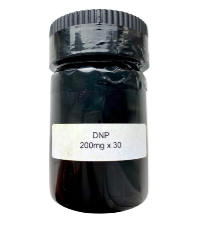
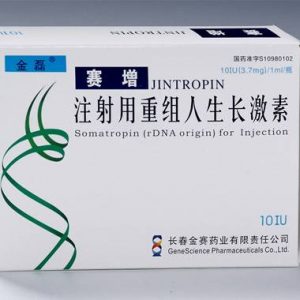


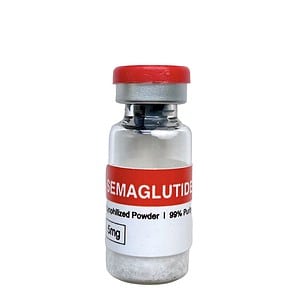
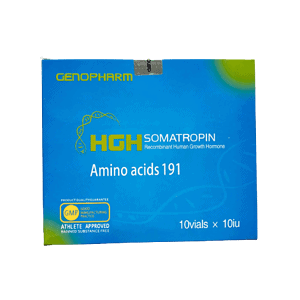

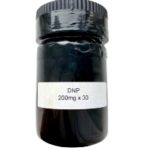
Reviews
There are no reviews yet.